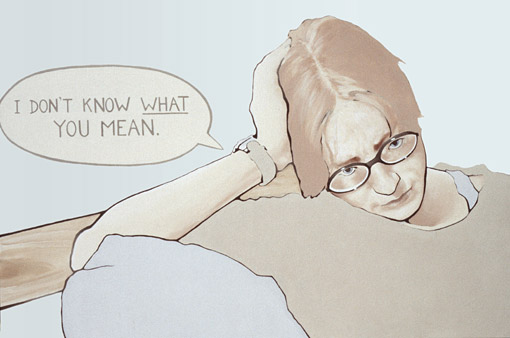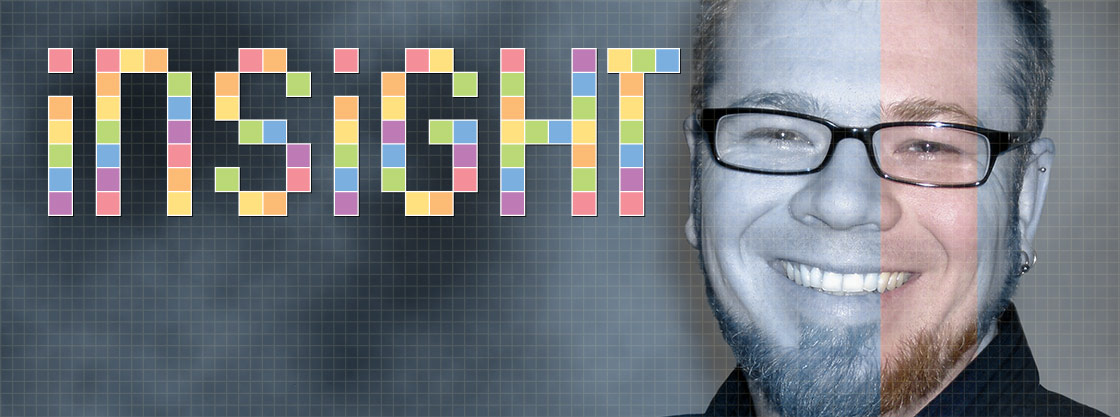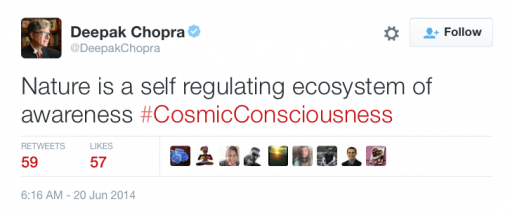
Painting by Daniel Loxton, c.1999. Acrylic on canvas. 24″x36″.
The journal Judgment and Decision Making has stirred considerable interest with a recent paper titled “On the Reception and Detection of Pseudo-Profound Bullshit,” by Pennycook et al (read PDF). The authors conducted four surveys designed to explore differing individual reactions to “seemingly impressive assertions that are presented as true and meaningful but are actually vacuous.” That is, the authors are “interested in the factors that predispose one to become or to resist becoming a bullshittee.”1
Skeptics naturally share this interest.
The studies presented survey participants with vague, conceptually meaningless, buzzword-laden statements and asked them to rate the “relative profundity of each statement on a scale from 1 (not at all profound) to 5 (very profound).” The included statements were generated by two online tools: “The New Age Bullshit Generator” and Wisdomofchopra.com, which “constructs meaningless statements with appropriate syntactic structure by randomly mashing together a list of words used in Deepak Chopra’s tweets (e.g., ‘Imagination is inside exponential space time events’).”2 Some of the studies also included motivational aphorisms, simple factual statements, and actual tweets selected from Chopra’s Twitter feed,3 such as this one:
Participants were also asked to complete questions designed to assess their verbal intelligence, numeracy, cognitive biases, and “epistemically suspect beliefs”—paranormal beliefs, conspiracy theories, and acceptance of claims from so-called alternative medicine—among other variables.
The punchline is that some people do seem predisposed to more readily accept vague “pseudo-profound bullshit” as valuable or meaningful than do other people. Moreover, the tendency to over-value meaningless baloney was associated with other tendencies in these studies, including paranormal belief. Simplified descriptions of these results have been been trumpeted across blogs and social media under smug headlines such as “Study Finds People Who Fall For Nonsense Inspirational Quotes Are Less Intelligent.”
I’ll leave it to better qualified writers to analyze this interesting research. But I might share a thought or two about the implications for scientific skepticism. First, I’d caution self-identifying skeptics to be on guard against uncritically accepting the ego-stroking notion that skeptics are smarter than other people—a warning Steven Novella also raises in his take on the paper. Not only is that an ugly sort of temptation, but please note that this research did not assess subcultural skeptics in any sense. Also, we’re talking about complex, dynamic human phenomena, not picking teams. As always, it’s complicated.
For example, this research found an inconsistent relationship between the kinds of far-out beliefs that scientific skeptics study and participants’ ability to discriminate between conceptually meaningful motivational slogans and meaningless profound-sounding gibberish. “This measure,” observed the authors, “was related to analytic cognitive style and paranormal skepticism. However, there was no association between bullshit sensitivity and either conspiratorial ideation or acceptance of complementary and alternative medicine (CAM).” [Emphasis added.]
Moreover, some correlation between acceptance of (some) paranormal claims and “pseudo-profound bullshit” does not mean that people do not also often have sensible justifications for the paranormal and other “epistemically suspect” beliefs that they hold. I’ve argued at length that they frequently do:
In my experience, the top reasons people believe weird things are not only understandable, but identical to the reasons most skeptics believe things: they are persuaded by personal experiences (or by the experiences of a loved one); or, they are persuaded by the sources they have consulted.
The large majority of people accept at least one roundly-debunked paranormal or pseudoscientific claim. Teasing apart factors at play in those beliefs is fascinating and useful, but predispositions are not the whole story. As Carl Sagan remarked, “People are not stupid. They believe things for reasons.”4
But Really, I Don’t Even…???
But despite my conviction that paranormal beliefs frequently make more sense than skeptics suppose, it’s not always easy to see how. Sometimes it’s not even possible.
Statistical difference in responses to vague statements is not the only way in which skeptics and paranormal believers may fail to speak the same language. Sometimes we feel genuinely unable to understand what the hell the other is talking about. We can see that it’s meaningful to the other person, sense that it’s self-evident from their point of view. We can see that it matters to them. But it just seems… we struggle to… and then we give up.
You may feel this disconnect sometimes with paranormally-inclined friends, neighbours, and family members. Certainly I feel it when reading certain works by paranormal proponents. Some beliefs are easier to sympathize with; some are just too hard. I’ve advocated for the value of the intellectual vertigo we may experience if we manage to truly feel the persuasiveness of the other person’s belief—to “catch a glimpse of the Goblin Universe,” as it were. But sometimes we can’t. We may want to see what the other person sees. But it just looks like gibberish, like a “Magic Eye” composition that refuses to resolve into an image.
It’s disconcerting how wide the chasm of language and foundational assumptions may sometimes prove between two people—in a profound sense, the distance between two parallel universes. We can stand in a room with someone, converse with them, laugh, share, empathize with each other in many ways, and yet somehow still occupy worlds with differing laws of physics, diverging epistemological frameworks, even incompatible rules of logic. This alienness is unnerving, and from a communications perspective, daunting. How can anyone bridge such deep conceptual divides in any practical amount of time? We rarely get more than a few seconds to reach someone in a blog post, outreach message, or everyday personal exchange.
The skeptical literature contains many contributions from people who have taken this challenge seriously. A great place to start is Karla McLaren’s 2004 Skeptical Inquirer article, “Bridging the Chasm Between Two Cultures.”
It’s vital that a way be found to help people in my [New Age] culture question, think about, and critically interpret the barrage of information and misinformation they receive on a daily basis. However, it’s also vital that the information be culturally sensitive. … I know firsthand that the skeptical viewpoint cannot [currently] be heard or assimilated in the New Age and metaphysical community; it is anathema, and that’s a shame for every single one of us.
Other noteworthy discussions in this vein include astronomer Phil Plait’s “Don’t Be a Dick” speech (video), psychologist Ray Hyman’s influential essay “Proper Criticism,” and of course Carl Sagan’s Demon-Haunted World. Sagan returned to the theme many times, advising skeptics to “temper our criticism with kindness.”5 Aaron’s World producer Mike Meraz contributed a worthy grassroots effort with his short-lived program Actually Speaking, a podcast which explored “the human side of skepticism…from an interpersonal perspective”—that is, a communication primer for skeptics. All advised speaking softly and listening hard.6
It should be understood that none of these contributions “solved” the problem in any ultimate sense. The truth is that it’s difficult to effectively communicate ideas, especially if those ideas challenge deeply held beliefs. These writers have instead tended to focus on communication’s “easy” problem: removing unnecessary obstacles to understanding, and avoiding willful alienation of the very people one wishes to reach.
References
- Gordon Pennycook, James Allan Cheyne, Nathaniel Barr, Derek J. Koehler, and Jonathan A. Fugelsang. “On the Reception and Detection of Pseudo-Profound Bullshit.” Judgment and Decision Making, Vol. 10, No. 6, November 2015, pp. 549–563. (PDF)
- Ibid.
- Ibid. The authors add, “We emphasize that we deliberately selected tweets that seemed vague and, therefore, the selected statements should not be taken as representative of Chopra’s tweet history or body of work.”
- Carl Sagan. “Wonder and Skepticism.” Skeptical Inquirer. Volume 19.1, January / February 1995. As republished at http://www.csicop.org/si/show/wonder_and_skepticism
- Carl Sagan. The Demon-Haunted World. (Random House: New York, 1996.) p. 298
- This is the same sentiment we emphasize in our motto here at the Skeptics Society:
I have made a ceaseless effort not to ridicule, not to bewail, not to scorn human actions, but to understand them.












Has anyone tried the Socratic question-and-answer approach? The best way to change someone’s mind is for them to be the changer. Isn’t it? I mean, you don’t have to necessarily assert anything and you totally avoid preaching at someone. Lecturing or preaching is the easiest way to turn someone completely off or make them defensive.
Far out! What was that all about?
A couple suggestions if you want people to actually READ with any care– and this goes to the heart of the rather abysmal communication skills of those who seek enlightenment no longer than a tweet and spew dime store wisdom via bumper sticker slogans.
First, many of us actually do, believe it or not, prefer to read print on paper. Indeed, studies have shown that one absorbs more and reads more carefully with print on paper. (Just google it.) This fact is commonly demonstrated quite well by most web article commentary which too often testifies to the fact that the person has, indeed, not read carefully at all – just far enough to invite their uninformed opinion. So “if people don’t know what you mean” it may be because the Internet invites lack of understanding and the twitterati can’t follow an idea farther then a civic center pigeon can fly and/or have the attention span of a poodle.
No wonder we have charlatans of Chaucerian dimension (like Dr. Depok Woo Woo Chopra) spewing new age garbage — no wonder his .
And by the way, there is a book on this old wine in a new bottle. See ISBN 9781616161411 which addresses the pseudo-intellectual bullshit of “meaningless profound-sounding gibberish” that falls under the rubric of “complex, dynamic human phenomena” no matter what your “analytic cognitive style.”
Charlatan babblers and pseudo-intellectuals of every color and stripe aside we need only look into our daily lives (how much time we all spend untangling snarled communications we were in too much of a hurry to communicate effectively in the first place) to understand that there’s something about email and the Internet that appeals to lazy minds and wooly thinkers whose communication skills are so rotten they eagerly become the ready prey of people like the emperor has no cloths Doctor Woo Woo.
There is an underlying belief unstated in your writing that perhaps you are not aware of. That the survival of the human race is a desirable thing.
In my 72 years I have watched human behavior from very close up. I was on the lines in 68 in Chicago. My high school friends were born in american concentration camps in the desert. The vast majority of all human beings are racist to their cores. They evolved to be that way.
It’s all a terrible failed experiment and it is going to come to its logical and sticky end much sooner than I had expected. To a first approximation, all species are extinct. Humans are going to have a relatively short run and the biosphere will give a sigh of relief.
The belief that we are somehow special is something that would be touching in a child but is not supported by the evidence.
We are talking past each other. I wish for a better resolution but I expect otherwise.
Mike,
In one of the Frank Herbert’s “Dune” books, among the “other” texts at the end (at least in the edition I read, I remember), there was a passage that ressonated deeply with me, showing the true role of humans in Nature.
In the text, it was explained that the Fremen, the original inhabitants of the desert planet Dune, were enraptured by the dream of an outsider planetologist to transform the desert planet in a “normal” planet, with open water and plants.
They dedicated themselves to this multigenerations plan, and even developed a special symbolic language to represent and calculate the various ecological elements necessary to make the transformation possible (THAT would be an interesting language!). In that language, they did not describe themselves as an important factor, but as small peripherical carrion hunters.
The problems we face, I think, derive from the fact that these small peripherical carrion hunters proliferated too much! ;o)
I’m not sure I see why I should put out any effort at all to communicate with delusional people. There are millions of rational humans out there and I prefer to spend my time being with those ones. So what if my sort of people are in the minority. I’m not on a desert island with few to choose from.
If you are out to change the world then you are the deluded one. People have consistently been gullible fools and dolts for thousands of years. That’s not going to change.
Mike,
I think the problem, at least in USA, is that many of these ‘delusional’ people VOTE. Many are ANTI-Science. It seems that more of them are against family planning, and are having more children than the ‘Science based’ types. End result COULD affect all of us when they get into power (2/3 there already) and lead us into war, or scare the next Einstein out of moving to USA. (so some other country gets the benefit of that type genius, and they win the next global scale confrontation). Might not immediately impact our lives, but I think it absolutely will at some point in the future ! So, we might not convince any of the delusional, but sometimes (at some degree of personal risk), we might be the one in a crowd that speaks up, questioning a group delusion. If all the skeptics did that, maybe we could slow the march to war.
I know I should try to understand you but I’m more content right now checking out Xmas cake recipes.